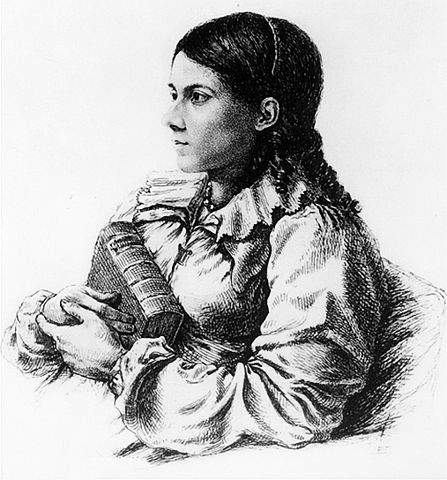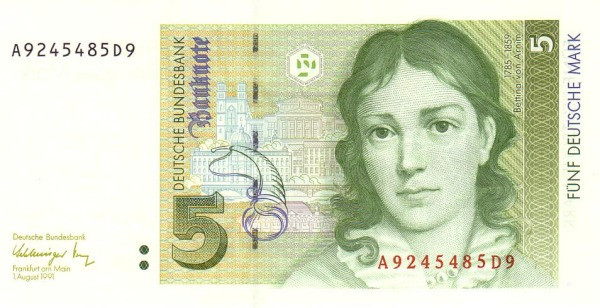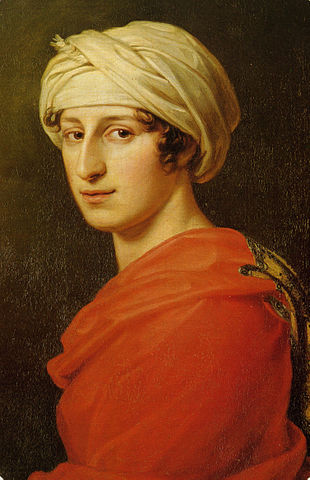On 26 June 1812 Beethoven inscribed a short piano trio to nine-year-old Maximiliane Brentano: “for my little friend Maxe Brentano to encourage her with her piano-playing.” Maximiliane was a daughter of Beethoven’s friends, Franz and Antonie Brentano.
#Beethoven250 Day 254
Allegretto for Piano Trio in B♭ Major (WoO 39), 1812
This work written for the young Maximiliane Brentano is still inspiring young musicians.
Beethoven-Haus has a painting of Maximiliane Brentano (b. 1802) with her younger sister Josepha (b. 1804) and their father Franz. Franz Brentano (b. 1765) was the half-brother of Bettina Brentano (b. 1785) and Clemens Brentano (b. 1778).
While in her early 20s, Bettina Brentano established an epistolary relationship with Goethe. She later published their letters as “Goethe’s Correspondence with a Child,” much of which literary historians believe to have been fabricated.

Bettina Brentano first met Beethoven in Vienna in 1810. See Beethoven: Impressions by His Contemporaries, (Schirmer, 1926; Dover, 1967), pp. 75–88, for what seems to be a somewhat fanciful account of their meeting and conversations.

Bettina married poet Achim von Arnim (b. 1781) in 1811. A few years earlier, Arnin and Bettina’s brother Clemens collaborated on the influential collection of German folk poems and songs called Des Knaben Wunderhorn (“The Youth’s Magic Horn,” 1805–08). Beethoven did not set any of the Des Knaben Wunderhorn poems to music, but many other German composers of the 19th and early 20th centuries did so, including Mendelssohn, Schumann, Brahms, Schoenberg, Berg, and most extensively and enthusiastically, Gustav Mahler.
In early July 1812, Beethoven moved to the spa town of Teplitz for the summer. In one letter, he reveals a little about his daily routine there:
I must now refrain from writing anything more and instead I must splash about again in the water. Hardly have I performed the duty of filling my inside with a large quantity of this water when again I must have my outer surface washed down with it several times. (Anderson, Beethoven Letters No. 380)
On 6 and 7 July 1812, shortly after arriving in Teplitz, Beethoven composed a long letter, which concludes:
Even when I am in bed my thoughts rush to you, my eternally beloved, now and then joyfully, then again sadly, waiting to know whether Fate will hear our prayer — To face life I must live altogether with you or never see you. Yes, I am resolved to be a wanderer abroad until I can fly to your arms and say that I have found my true home with you and enfolded in your arms can let my soul be wafted to the realm of blessed spirits …
Angel, I have just heard that the post goes every day — and therefore I must close, so that you may receive the letter immediately — Be calm; for only by calmly considering our lives can we achieve our purpose to live together — Be calm — love me — Today — yesterday — what tearful longing for you — for you — my life —my all —all good wishes to you — Oh, do continue to love me — never misjudge your lover’s most faithful heart.
ever yours
ever mine
ever ours
L.
The letter was never sent.
Over the years, many candidates have been proposed as the intended recipient of the Immortal Beloved letter. In his book Beethoven (2nd rev. ed., 1998), Maynard Solomon devotes Chapter 15 to “The Riddle” and “The Solution” and concludes that it was Antonie Brentano.

Antonie Brentano was the wife of Franz and the mother of Maximiliane as well as three other children. She was also a month pregnant at the time Beethoven wrote the Immoral Beloved letter. Beethoven knew and socialized with the whole Brentano family.
At least in the English-speaking world, most Beethoven scholars seem to have accepted Maynard Solomon’s conclusions. In his biography of Beethoven, Jan Swafford dissents and chooses instead Antonie’s sister-in-law Bettina.
Ten days after the Immortal Beloved letter, Beethoven wrote to a girl known today only as Emilie M., probably 8 to 10 years old, who played the piano and who had sent him a handmade wallet in thanks and appreciation for his music. He responded in part:
Persevere, do not only practice your art, but endeavour also to fathom its inner meaning; it deserves this effort. For only art and science can raise men to the level of gods. If, my dear Emilie, you should ever desire to have anything, do not hesitate to write to me. The true artist has no pride. He sees unfortunately that art has no limits; he has a vague awareness of how far he is from reaching his goal; and while others may perhaps be admiring him, he laments the fact that he has not yet reached the point whither his better genius only lights the way for him like a distant sun. (Anderson, Beethoven Letters No. 376)
While in Teplitz in the summer of 1812, Beethoven and Goethe finally met, perhaps facilitated by Bettina von Arnim née Brentano.
Goethe arrived in Teplitz on 14 July. “Goethe is here!” announced Beethoven in a letter three days later (Letter No. 375).
“That Goethe is here I have already told you,” Beethoven wrote on 24 July.
I spend some time with him every day. He has promised to write something for me. If only I do not have the same experience with him as others have with me!!! — One feels a distaste for several things, yet one makes a promise and has every intention of fulfilling it; and in the end nothing comes of it … (Letter No. 379)
Alas, nothing came of the talk between Beethoven and Goethe of collaboration.
Beethoven didn’t care for what he saw as Goethe’s overly deferential attitude towards royalty:
Goethe delights far too much in the court atmosphere, far more than is becoming to a poet. How can one really say very much about the ridiculous behaviour of virtuosi in this respect, when poets, who should be regarded as the leading teachers of the nation, can forget everything else when confronted with that glitter. (Letter No. 380)
Here’s Bettina’s version of the different attitudes towards royalty of Beethoven and Goethe:
While they were walking there came towards them the whole court, the Empress and the dukes; Beethoven said: “Keep hold of my arm, they must make room for us, not we for them.” Goethe was of a different opinion, and the situation became awkward for him; he let go of Beethoven’s arm and took a stand at the side with his hat off, while Beethoven with folded arms walked right through the dukes and only tilted his hat slightly while the dukes stepped aside to make room for him, and all greeted him pleasantly; on the other side he stopped and waited for Goethe, who had permitted the company to pass by him where he stood with bowed head. “Well,” he said, “I’ve waited for you because I honor and respect you as you deserve, but you did those yonder too much honor.” (Beethoven: Impressions by His Contemporaries, p. 87)
In a letter dated 2 September 1812, Goethe wrote:
I met Beethoven at Teplitz. His talent amazed me; but unfortunately he has an absolutely uncontrolled personality. Admittedly he is not wrong in finding the world detestable, and yet by so doing he does not make it any more pleasant either for himself or for others. At the same time he deserves to be greatly forgiven and greatly pitied, for his deafness is increasing. This impairs the musical side of his nature perhaps less than the social side. Naturally of a reserved disposition he is becoming doubly so by reason of this infirmity.
In other 1812 news, on 24 July, Napoleon’s Grand Armée began the campaign to invade Russia. With 685,000 soldiers — the largest army ever assembled — victory was certain.